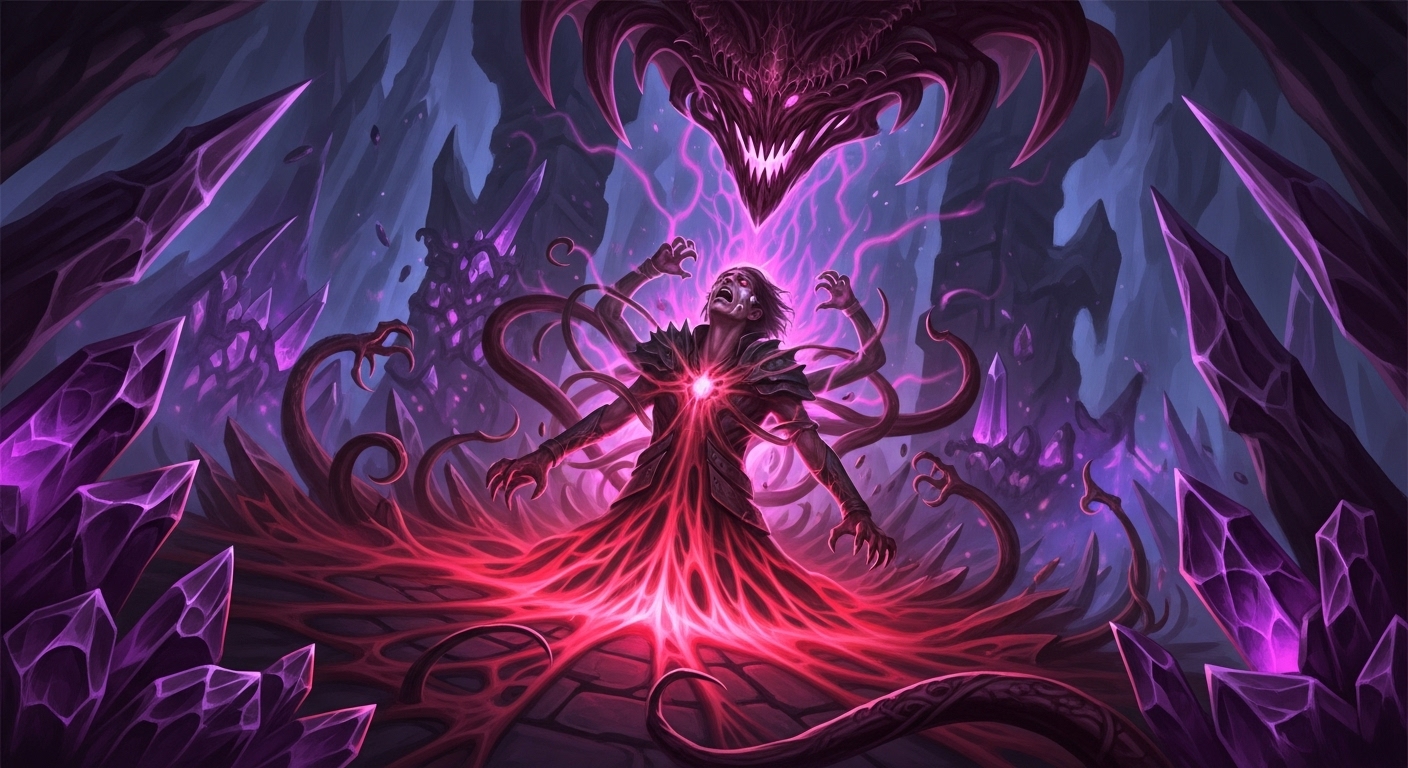Dissonant Whispers

- Level: 1
- School: Enchantment
- Class: Bard
- Casting Time: Action
- Range: 60 feet
- Components: V
- Duration: Instantaneous
One creature of your choice that you can see within range hears a discordant melody in its mind. The target makes a Wisdom saving throw. On a failed save, it takes 3d6 Psychic damage and must immediately use its Reaction, if available, to move as far away from you as it can, using the safest route. On a successful save, the target takes half as much damage only.
Using a Higher-Level Spell Slot. The damage increases by 1d6 for each spell slot level above 1.
Tactical Usage
Psychic Control: Dissonant Whispers provides damage plus forced movement for tactical positioning. This 1st-level enchantment spell excels at separating enemies and triggering opportunity attacks.
Optimal Timing: Most effective when enemies are positioned near allies, when forced movement creates tactical advantages, or for early-game damage.
Resource Management: Uses a 1st-level spell slot - available from character level 1+. Bard-exclusive spell with excellent scaling potential.
Target Selection: Prioritize enemies adjacent to party members to trigger opportunity attacks, or isolated targets for pure damage.
Spell Combinations
Synergistic Spells:
- Opportunity Creation: Combine with positioning spells to maximize opportunity attack potential
- Psychic Enhancement: Layer with other enchantment magic for comprehensive mind control
- Damage Amplification: Pair with vulnerability effects to maximize psychic damage
Class Feature Interactions:
- Bardic Inspiration: Enhances party coordination for taking advantage of forced movement
- Spell Critical: Features that enhance spell damage improve psychic effectiveness
- Mind Magic: Enchantment-focused abilities improve overall mental manipulation
Multi-Caster Coordination: Multiple bards can control battlefield positioning through coordinated forced movement.
Material Component Details
Component Acquisition: No material components required - only verbal component needed.
Component Handling: Verbal-only casting allows use even when hands are restrained or occupied.
Roleplay Opportunities: Different discordant melodies might reflect personal musical style or dark magical traditions.
Economic Considerations: No costs make this economically viable for frequent battlefield control and damage.
Creator Notes
Encounter Balancing: Forced movement and psychic damage affects encounter positioning and tactics significantly.
NPC Usage: Enemy bards or mind-focused creatures can disrupt party formations and force tactical repositioning.
Environmental Considerations: 60-foot range allows flexible targeting across most encounter areas.
Campaign Integration: Excellent early-game damage that remains tactically relevant through forced movement utility.
Environmental Interactions
Terrain Effects: 60-foot range allows targeting across most encounter areas. Forced movement interacts with environmental hazards.
Weather Influence: Unaffected by weather conditions, providing reliable psychic assault regardless of external factors.
Structural Interactions: Forced movement can push targets into walls, obstacles, or environmental dangers.
Elemental Interactions: Psychic damage bypasses most physical resistances, affecting creatures regardless of physical nature.
Common Rulings & Clarifications
Timing Questions: Action casting time with instantaneous effect. Uses target's reaction for forced movement.
Target Limitations: Single creature within 60 feet. Wisdom save for half damage, failed save triggers movement.
Duration Interactions: Instantaneous damage and movement. Movement uses target's reaction if available.
Mechanical Interactions: 3d6 base psychic damage, +1d6 per upcast level. Forced movement away via safest route.
Alternative Applications
Non-Combat Uses: Psychological intimidation, forcing retreats from social situations, or creating space in crowded areas.
Social Encounters: Subtle intimidation through mental discomfort, forcing people away from conversations, or demonstrating mental power.
Exploration Applications: Forcing creatures away from areas, creating space for party movement, or disrupting enemy formations.
Utility Functions: Crowd control, emergency escape creation, behavioral modification, or psychological pressure.
Related Spells
Same School: Other enchantment spells like command (1st level mind control), suggestion (2nd level behavioral influence), dominate person (5th level complete control).
Similar Effects: thunderwave (1st level forced movement), fear (3rd level fear-based movement), command (1st level single action).
Progression Options: dissonant whispers (1st level forced movement), suggestion (2nd level behavioral control), dominate person (5th level mental domination).
Complementary Magic: command (additional mental control), hold person (prevent movement), charm person (friendly mental influence).
Scaling Analysis
Level Progression: Remains valuable throughout campaigns for battlefield positioning and reliable damage scaling.
Upcast Benefits: Additional 1d6 damage per slot level makes higher-level casting increasingly effective.
Campaign Phases: Peak effectiveness in early-to-mid game where positioning control and scaling damage provide maximum value.
Comparative Value: Excellent versatility magic that justifies 1st-level slot for damage plus tactical positioning.
Narrative Flavor
Casting Description: A cacophonous discord resonates directly in the target's mind as psychological torment manifests as audible agony.
Effect Manifestation: The target recoils in mental anguish as discordant notes cause psychological pain and instinctive retreat.
Personal Style: Bards might use specific musical dissonance, corrupted melodies, or jarring harmonic combinations that reflect their artistic background.
World Integration: Represents psychological assault magic exclusive to musical and artistic magic traditions, often associated with dark bardic practices or mental manipulation techniques.